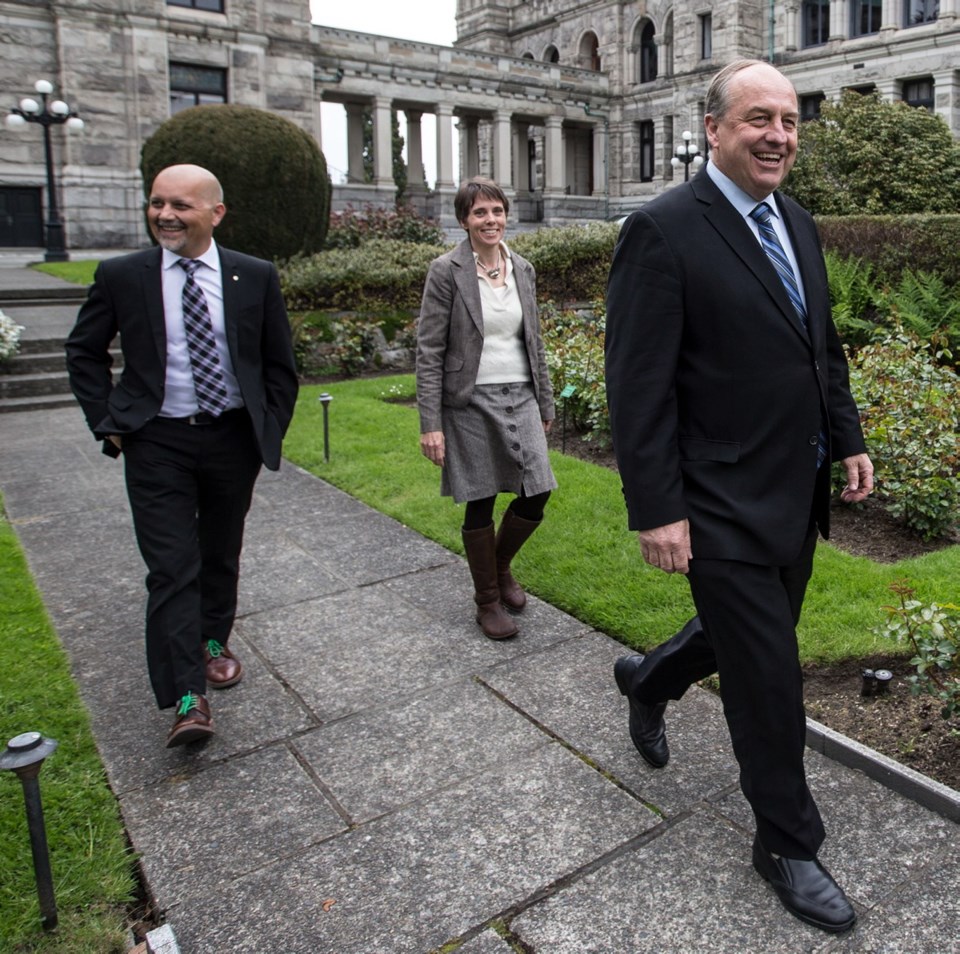Now that the B.C. government has offered financial inducements to ensure the construction of a liquefied-natural-gas plant in Kitimat, the question must be asked: How should Andrew Weaver respond?
The B.C. Green Party leader has already expressed disbelief that his NDP partners would usher in what he called the biggest single source of greenhouse-gas emissions in Canadian history.
Hasn’t the government repeatedly said it wants to be a climate-change leader? Yet collectively, the incentives are richer than anything the preceding B.C. Liberal administration contemplated.
Weaver went on to liken the deal to professing concern over the opioid crisis, while “putting in an order for a massive shipment of cocaine from Colombia.”
Strong words, but although his party has voted against the enabling legislation, it has done so secure in the knowledge that the vote will make no difference. With the Liberals supporting the NDP, the bill is assured of passage.
Indeed, when a vote that would have made a small difference came this week, the Greens abstained. The Liberals had introduced an amendment, and Weaver called for a recorded vote. But his party then fled the chamber before the vote was taken.
Weaver had an explanation, namely that his party has opposed the project from the outset. The vote in question could not affect the ultimate passage of the bill, and he had no intention of taking sides: “We don’t want to have any part of voting for or against amendments on this legislation. We think the bill is a generational sellout.”
But then why call for a recorded vote? All that accomplished was to hand the other parties a stick to beat him with. Afterward, Liberal MLA Mike de Jong said the Greens have a new slogan: “When the going gets tough, the Greens get lost.”
This is not the first time a promise to protect the environment has been broken by the current government. Shortly after the NDP was elected, Premier John Horgan announced that B.C. Hydro’s Site C dam would go ahead. This infuriated Green supporters.
Weaver declined to bring down the government on that occasion, a choice that can be understood. The referendum on electoral reform lay ahead, and had it carried, his party would have been the major beneficiary.
But now that hope is gone, what other reason is there to preserve the marriage? It has become clear that on controversial environmental issues, the NDP will stick with middle-of-the road voters.
But the Greens are an activist party, committed not to following public opinion, but to changing it. Weaver must ask himself whether it is now in his best interest to maintain his alliance with the NDP. Purely symbolic actions, such as voting against a bill that was guaranteed to pass, might not satisfy supporters.
The alternative is to sever his alliance with the NDP. That would in all probability bring the government down and force an election. Yet there are grounds for taking that path.
Minority parties that form pacts with larger allies often fall by the wayside if the deal goes on too long. Voters see little to distinguish them from the ruling partner.
Sooner or later, a government clinging to the narrowest of margins will be forced to call an election. Weaver must decide now upon whose grounds that campaign is fought — his or the NDP’s.
At present, the Greens are in a strong position. They could remind voters that this is the second time the governing party has defaulted on its pledge to stand up for the environment. Nothing would separate them more clearly from the NDP.
Weaver could campaign on a platform of honouring his commitments, and leave the NDP to plead for understanding. And there is an audience for such a message. A recent Angus Reid poll suggested that among voters, the second highest priority was protecting the environment (health care came first).
But the window for taking a principled stand is rapidly closing. With the passage of the Kitimat bill assured, decision time has arrived for Weaver and his colleagues.



